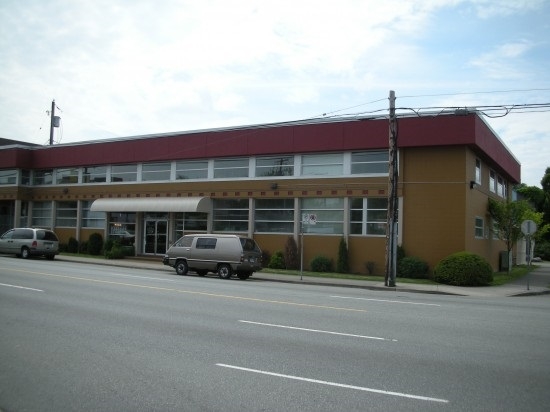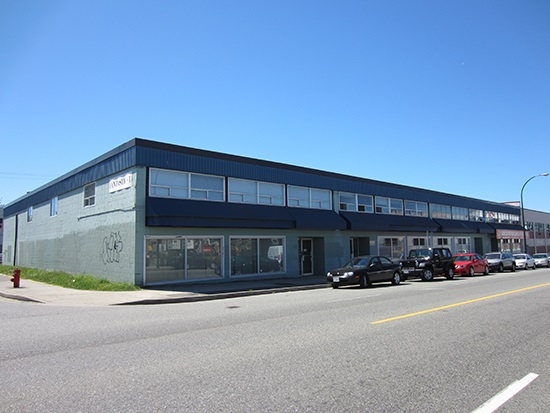|
Port Metro Vancouver released its 2013 year-end results earlier this week. There are record numbers, but one local expert has a caveat. (Call Guinness records... but have the beverage handy, too.)  Colliers senior associate industrial Stefan Morissette says the report is “welcome news” in a relatively slow industrial leasing market. While he's “cautiously optimistic” the growth in the port's cargo imports will increase demand for distribution warehousing in the Lower Mainland, Stefan also brings out an all-too familiar caveat.  There are new developments underway or planned in Richmond, Delta, South Burnaby, and across the Fraser Valley. But five to 10 years from now, there will be a scarcity of property to be developed, “very concerning” in terms of the future growth of the market, Stefan adds. Stefan is snapped with colleague Andrew Lord.  How about that good news? Port Metro Vancouver handled 135 million tonnes of cargo, a record for the Port, and 9% increase over 2012. It handles 19% of Canada's total trade. (The rest, we assume, involves scalped tickets for Canucks games.) An increased demand for Canadian products, plus recovery in Asia and the ongoing transition to a consumer-based economy in China have bumped trade through the port.  Macdonald Commercial Real Estate Services managing director Tony Letvinchuk points to what the new South Fraser Perimeter Road is doing for Delta—a recognition by municipalities that a vibrant industrial sector is crucial for the region's economy, leading to more industrial space in the market. That and rising rents. Current industrial rents have remained relatively stable, and don't yet support additional density by way of multi-level industrial buildings. Snapped is 745 Clark Dr, a 21k SF industrial property Macdonald Commercial recently sold for $4.4M.  “Replacing older industrial buildings with higher ceiling height structures will serve to add industrial inventory to the market,” Tony says. (And maybe even lure another basketball team?) Pictured is 1362-1386 Venables St in the Clark Drive industrial area, a 21k SF industrial building Macdonald Commercial recently sold. Price is unavailable. Frontline Real Estate Services' Garth White says the balanced 9% growth in both export and import figures should begin to tilt in favour of growth in exports with the weakening Canadian dollar. He points to major infrastructure spending that has supported the growing port volume—in particular the Roberts Bank Rail Corridor, the South Fraser Perimeter Road, and the Port Mann Bridge: “That has created an efficient network that will benefit specifically the Delta Port and the Fraser Surrey Docks.” This will all have big impacts on the Delta, Surrey, and Langley industrial real estate markets, with Frontline taking a strategic focus on market development in Fraser Valley. |
|
 |
 |
Retail Is DetailThe reports that Target is taking a $940M loss in its Canadian operations has everyone talking. We asked for thoughts from retail consultant Raymond Shoolman, from DIG360 in Vancouver. “I think it is another case where mega companies become arrogant and lose focus of the customer and their expectations,” he says. Any retailer would love to have what Target had coming into the market—international brand recognition, consumer excitement, familiarity vis a vis the Canadian consumer since many had already shopped in their US stores. Plus they were following Walmart. However, Target is strong enough to sustain the setback and determine how and why they fit into the Canadian retail mosaic, Raymond says. In the image: a Target launch event. |
 |
 |
Why Renovations MatterWith the market softening, talk about an over-build is a buzz topic. (That and whether it's OK to collectively pretend the recession was just a bad dream.) Colliers AVP Dan Jordan says pent-up demand from tenants for new, high-quality product has been driving strong pre-leasing activity. He points to a necessary “balance” in the market that has been tilted too much in favour of landlords for several years. “Prudent” landlords who have reinvested in their building in recent years shouldn't see a dramatic impact in their occupancy levels. “However, owners of older buildings that haven't been proactive in their renovation and leasing programs could be in for some turbulent times,” Dan says. |
 |





